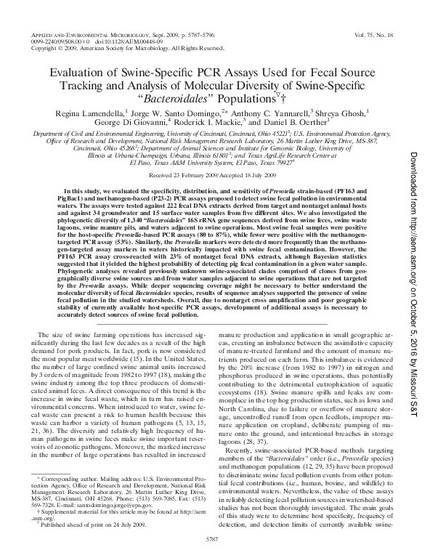
In this study, we evaluated the specificity, distribution, and sensitivity of Prevotella strain-based (PF163 and PigBac1) and methanogen-based (P23-2) PCR assays proposed to detect swine fecal pollution in environmental waters. The assays were tested against 222 fecal DNA extracts derived from target and nontarget animal hosts and against 34 groundwater and 15 surface water samples from five different sites. We also investigated the phylogenetic diversity of 1,340 "Bacteroidales" 16S rRNA gene sequences derived from swine feces, swine waste lagoons, swine manure pits, and waters adjacent to swine operations. Most swine fecal samples were positive for the host-specific Prevotella-based PCR assays (80 to 87%), while fewer were positive with the methanogen-targeted PCR assay (53%). Similarly, the Prevotella markers were detected more frequently than the methanogen-targeted assay markers in waters historically impacted with swine fecal contamination. However, the PF163 PCR assay cross-reacted with 23% of nontarget fecal DNA extracts, although Bayesian statistics suggested that it yielded the highest probability of detecting pig fecal contamination in a given water sample. Phylogenetic analyses revealed previously unknown swine-associated clades comprised of clones from geographically diverse swine sources and from water samples adjacent to swine operations that are not targeted by the Prevotella assays. While deeper sequencing coverage might be necessary to better understand the molecular diversity of fecal Bacteroidales species, results of sequence analyses supported the presence of swine fecal pollution in the studied watersheds. Overall, due to nontarget cross amplification and poor geographic stability of currently available host-specific PCR assays, development of additional assays is necessary to accurately detect sources of swine fecal pollution.
- 16S rRNA gene sequence,
- Bayesian statistics,
- Cross amplification,
- Environmental water,
- Fecal contamination,
- Fecal DNA,
- Fecal pollution,
- Fecal samples,
- Fecal sources,
- Molecular diversity,
- PCR assay,
- Phylogenetic analysis,
- Phylogenetic diversity,
- Prevotella,
- Sequence analysis,
- Swine manure,
- Swine operations,
- Swine waste,
- Water samples,
- Amplification,
- Contamination,
- DNA,
- Genes,
- Groundwater,
- Hydrogeology,
- Manures,
- Methanogens,
- Nucleic acids,
- Pollution detection,
- Water pollution,
- Assays,
- ground water,
- RNA 16S,
- surface water,
- bioassay,
- feces,
- methanogenesis,
- molecular analysis,
- pig,
- polymerase chain reaction,
- watershed,
- bacterium detection,
- Bacteroidales,
- cladistics,
- controlled study,
- gene sequence,
- methanogen,
- microbial diversity,
- nonhuman,
- nucleotide sequence,
- phylogeny,
- pig farming,
- swine,
- waste,
- Animals,
- Bacteroidetes,
- Biodiversity,
- Cluster Analysis,
- DNA Primers,
- Bacterial,
- Ribosomal,
- Environmental Microbiology,
- Molecular Sequence Data,
- RNA,
- 16S,
- Sensitivity and Specificity,
- Animalia,
- Suidae
Available at: http://works.bepress.com/daniel_oerther/67/
